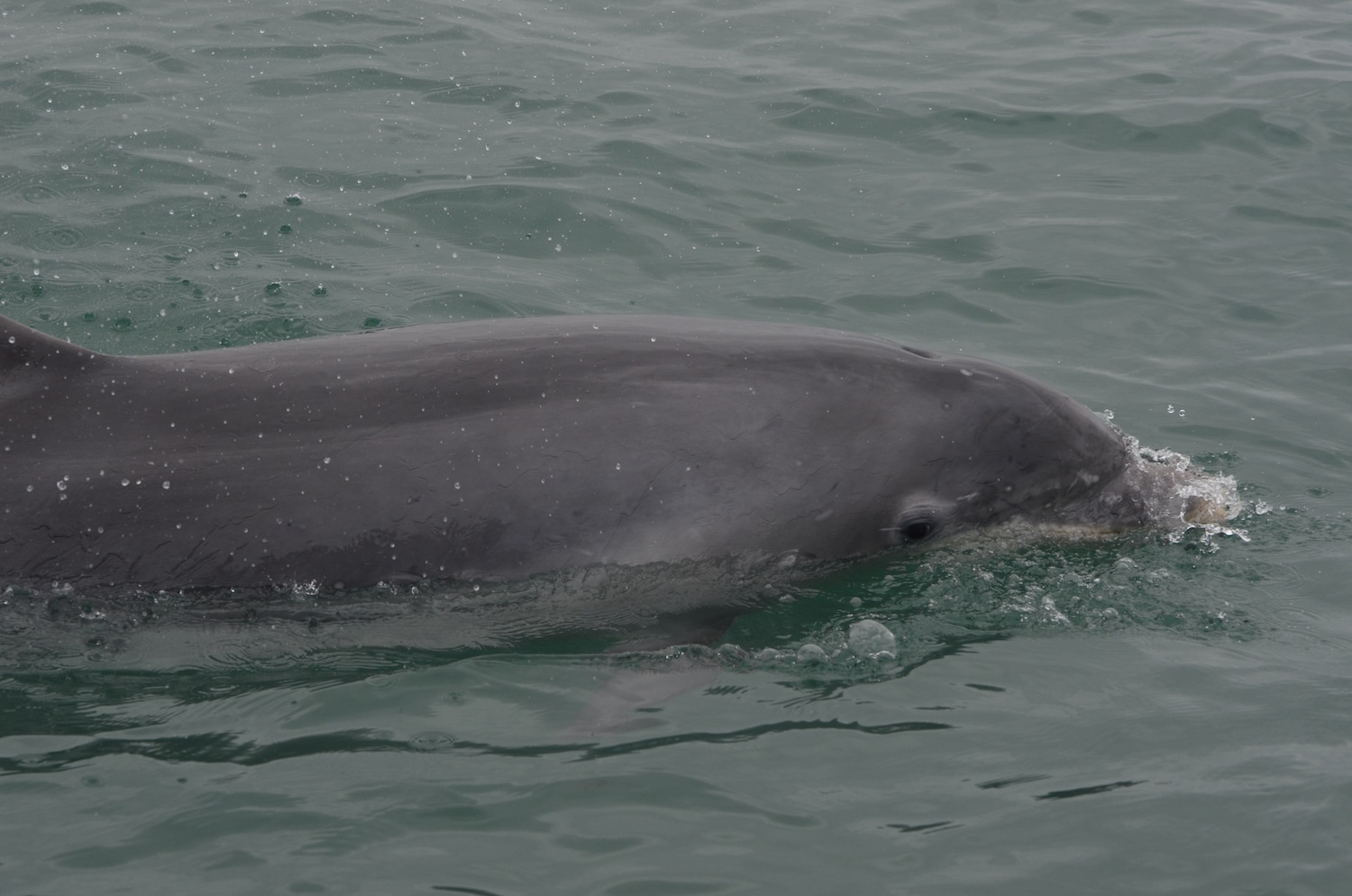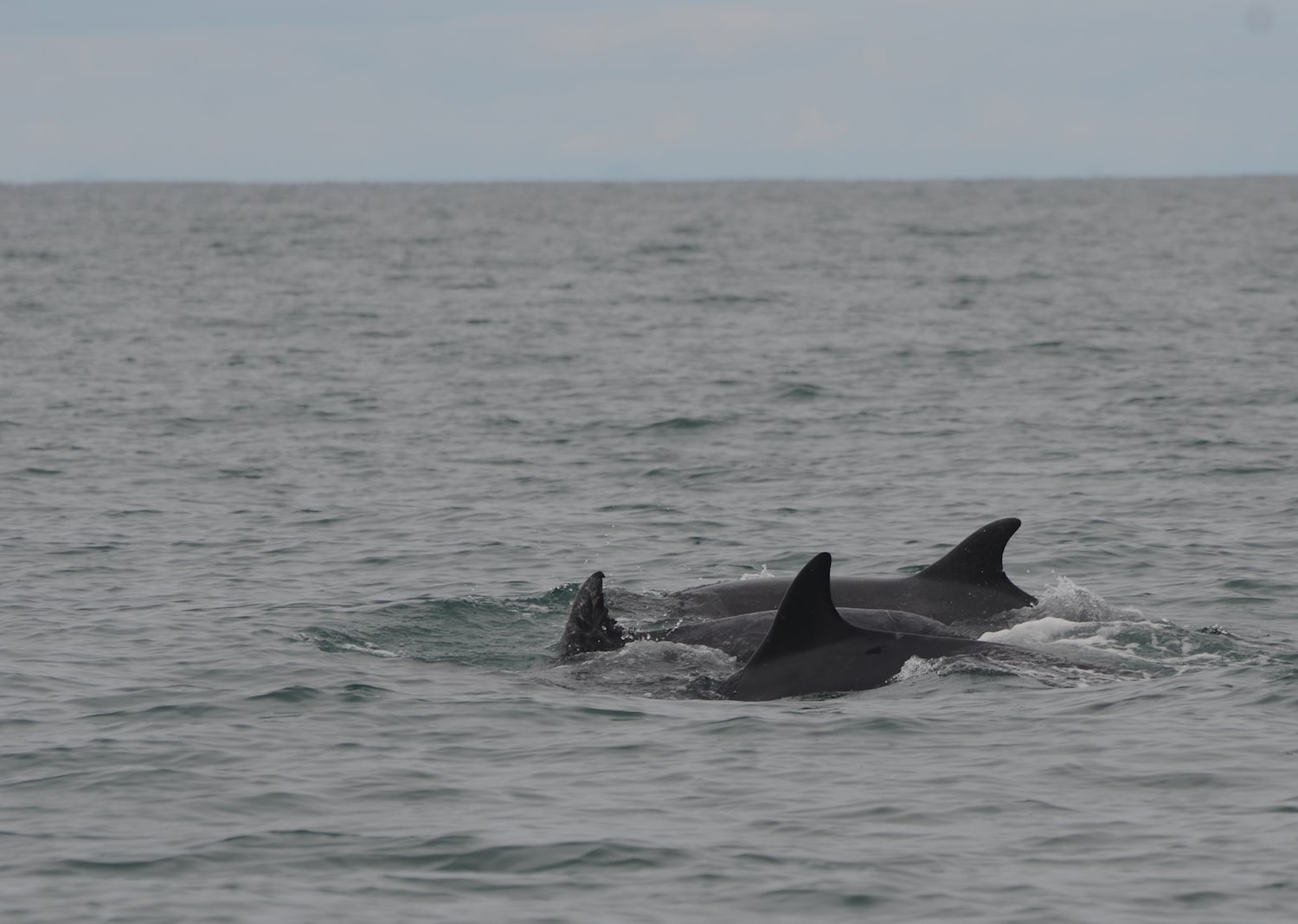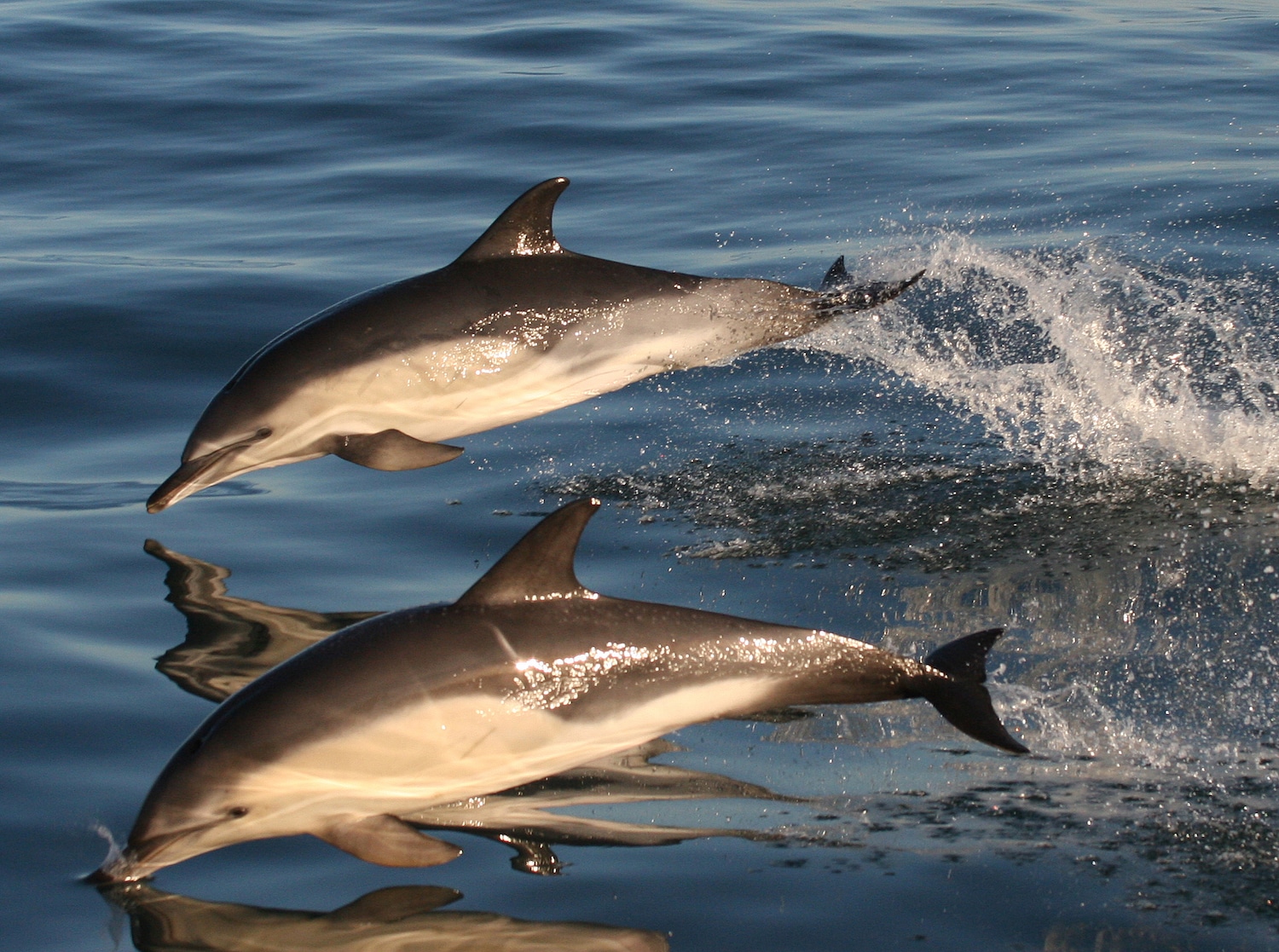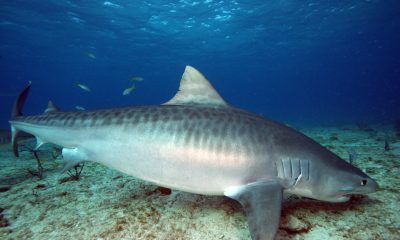Marine Life & Conservation
National Whale and Dolphin Watch 2018 is most successful yet! (Watch Video)

As the National Whale & Dolphin Watch concludes for another year, organisers are calling the 2018 event the most successful yet with an unprecedented variety of whale and dolphin species recorded around the UK during last week. Thirteen species and more than 500 sightings have been reported, and sightings continue to stream in.
“This looks like being the best National Whale & Dolphin Watch event of the last two decades,” reported Dr Chiara Giulia Bertulli, organiser of this year’s national event for the UK national research charity, Sea Watch Foundation.
The 2018 National Whale and Dolphin Watch event involving thousands of volunteers from all around the British Isles, conducted between 28th July and 5th August, has revealed the striking biodiversity of Britain’s Whales, Dolphins and Porpoises.

Photo: Chiara G. Bertulli / Sea Watch Foundation
This summer has seen a good number of humpback whale sightings all around the UK, with individuals popping up this last week in the North Sea off the Aberdeenshire coast and off Flamborough Head in Yorkshire. This species is making a noticeable come-back after many decades of exploitation in the North Atlantic.
“However, the most extraordinary sighting from this year’s Watch week”, adds Chiara, “was surely the Sowerby’s beaked whale which live stranded in the shallow waters of Belhaven in East Lothian, Scotland, on July 29th. This year also saw the addition of the striped dolphin, which in Britain and Ireland, is very rare, seen occasionally off the Atlantic coasts mainly in the south-west of Ireland. This species of warm temperate seas came to the shore at Pendine in South Wales on July 31st.”
Watch this video of short-beaked common dolphins filmed three miles off Dodman Point in South Cornwall.
Video: Rupert Kirkwood / thelonerkayaker:
At the time of writing, a total of 527 sightings have been submitted after the 9-day event. With regards to number of species recorded, results show that records at this stage are up 50% on last year. Cetacean data collection is strongly weather dependant. Factors such as sea state, swell height and visibility to the horizon affect how easily animals can be detected during a watch. Heavy rain and wind can even cause watches to be cancelled altogether.
For these reasons, every year, the volunteers rely heavily on good weather conditions for the success of National Whale and Dolphin Watch. Like previous years, this year’s event was scheduled over nine days to increase the chances of coinciding with a favourable weather window. The weather forecast at the beginning of the event was very poor with frequent showers and strong winds around the country which forced several watches to be cancelled and to be rescheduled to this past weekend. However, once the weather stabilized and the temperature increased the number of sightings increased dramatically and it showed.

Photo: SBCD – Peter G.H.Evans / Sea Watch Foundation
Possible explanations for this summer’s high number of cetacean species sighted during this year’s event are the good stable weather recorded this summer, with high temperatures which brought in warmer water species like striped dolphin, and created the conditions for plankton fronts to develop, attracting shoals of fish and in turn, whales and dolphins.
“We are seeing a general longer term trend,” adds Chiara, “for warm water species to be extending their range further north – species like the short-beaked common dolphin and the Risso’s dolphin as well as the striped dolphin. Since a greater number of species live in warm waters, the effects of climate change can actually be positive at mid latitudes such as around the British Isles.”
“We should still be a little cautious,” says Dr Peter Evans, Director of the Sea Watch Foundation. “Although new species of cetaceans have been added recently to the British list of mammals, there are more northern species that we could lose from our fauna – species like Atlantic white-sided dolphin and white-beaked dolphin, and the problem with tropical and warm temperate species entering our seas is that they face a much wider range of human pressures along the industrialised coastlines of northern Europe.”
All the verified sightings so far can be viewed online – www.seawatchfoundation.org.uk/nwdw-2018 – where they are updated as more reports come in.

Marine Life & Conservation
Leading UK-based shark conservation charity, the Shark Trust, is delighted to announce tour operator Diverse Travel as a Corporate Patron

 Corporate Patrons provide a valuable boost to the work of The Shark Trust. The Trust team works globally to safeguard the future of sharks, and their close cousins, the skates and rays, engaging with a global network of scientists, policymakers, conservation professionals, businesses and supporters to further shark conservation.
Corporate Patrons provide a valuable boost to the work of The Shark Trust. The Trust team works globally to safeguard the future of sharks, and their close cousins, the skates and rays, engaging with a global network of scientists, policymakers, conservation professionals, businesses and supporters to further shark conservation.
Specialist tour operator Diverse Travel has operated since 2014 and is committed to offering its guests high quality, sustainable scuba diving holidays worldwide. Working together with the Shark Trust will enable both organisations to widen engagement and encourage divers and snorkellers to actively get involved in shark conservation.
“Sharks are truly at the heart of every diver and at Diverse Travel, we absolutely share that passion. There is nothing like seeing a shark in the wild – it’s a moment that stays with you forever!” says Holly Bredin, Sales & Marketing Manager, Diverse Travel.
“We’re delighted to celebrate our 10th year of business by becoming a Corporate Patron of the Shark Trust. This is an exciting partnership for Diverse and our guests. We will be donating on behalf of every person who books a holiday with us to contribute towards their vital shark conservation initiatives around the world. We will also be working together with the Trust to inspire divers, snorkellers and other travellers to take an active role – at home and abroad – in citizen science projects and other activities.”
Paul Cox, CEO of The Shark Trust, said:
“It’s an exciting partnership and we’re thrilled to be working with Diverse Travel to enable more divers and travellers to get involved with sharks and shark conservation. Sharks face considerable conservation challenges but, through collaboration and collective action, we can secure a brighter future for sharks and their ocean home. This new partnership takes us one more valuable step towards that goal.”
For more information about the Shark Trust visit their website here.
For more about Diverse Travel click here.
Marine Life & Conservation
Shark Trust Asks Divers to help with Shark Sightings this Global Citizen Science Month

 Whether you are stuck for ideas of what to do with the kids or are off on the dive trip of your dreams. You can get involved in Citizen Science Month and help the Shark Trust by providing vital data about sharks are rays both close to home and further afield.
Whether you are stuck for ideas of what to do with the kids or are off on the dive trip of your dreams. You can get involved in Citizen Science Month and help the Shark Trust by providing vital data about sharks are rays both close to home and further afield.
In addition to reporting the sharks and rays you see on your dives, the eggcases you find on the beach, the Shark Trust is looking for some specific data from divers who are asked to report any Oceanic Whitetip and Basking Sharks.
Oceanic Whitetip Sharks
The Shark Trust are looking specifically for Oceanic Whitetip Shark sightings over the coming weeks and months. So, if you are diving anywhere in the world, please report your sightings via the website or app.
Website: https://recording.sharktrust.org/
App: Search The Shark Trust in your app store
The Oceanic Whitetip. Known for their incredibly long dorsal and pectoral fins, this species was once the most abundant oceanic-pelagic species of shark on the planet.
Large and stocky, they are grey or brown above, and white below and famous for their huge rounded first dorsal fin and paddle-like pectoral fins. The fins also highly prized within the shark fin trade. Whilst they are mostly solitary, Oceanic Whitetips do occasionally hunt in groups.
An inquisitive species, they were easy prey for fisheries. Combined with their low reproductive rate, they were inevitably at high risk of population depletion. And declines of up to 99% have been reported in certain sea areas. They are listed as Critically Endangered on the IUCN Redlist (2019).
Conservation efforts to discourage further declines include listing on CITES Appendix II and CMS Appendix I. They’re also the only species prohibited from take by all the Tuna RFMOs (Regional Fisheries Management Organisations). However, these measures do not mean that Oceanic Whitetips are not still caught – whether targeted or as bycatch – in some parts of the world. With populations declining at such a high rate, effective implementation of management measures is essential to ensure that the species can recover.
If you are lucky enough to get an image of an Oceanic Whitetip and you record your sighting on the Shark Trust app or website YOU CAN WIN! All images submitted with sightings, that also give consent to use in conservation messaging, will be in with a chance to win an Oceanic Whitetip T-shirt and mug. The competition will run until the end of “Shark Month” in July – so keep those sightings (and images) coming in.
Basking Sharks
Basking Shark (Cetorhinus maximus) season is upon us, and the Shark Trust is asking everyone to keep an eye out for these majestic giants over the summer months. If you see any, you can record your sighting to the Basking Shark Sightings database.
Each year, these mighty fish return to British waters to feed on plankton. You may see one, (or a few if you’re really lucky) from around April-October. They can be seen feeding at the surface of the water, where they look like they’re basking in the sun. Thus, their name!
Sighting hotspots around the British Isles include southwest England, Isle of Man, north coast of Ireland, and western Scotland. The Sea of the Hebrides is the most prolific sightings area in Scotland, but they have been spotted all around the coast and have even ventured into some of the sea lochs. The Shark Trust has received thousands of sightings since the Basking Shark project began, but more data is needed to truly understand what is going on with population numbers and distribution. You can help by recording your sightings this summer.
Great Eggcase Hunt
The Shark Trust has an Easter Egg Hunt with a difference for you to try. Take part in the Great Eggcase Hunt and get involved with a big citizen science project that helps shark, ray and skate conservation. And it’s an enjoyable activity for all the family.
The Shark Trust also want snorkellers and divers to record their underwater eggcase findings. Underwater records help pinpoint exactly where sharks and skates are laying their eggs and can help link to beach records. Learning the depth and substrate that they lay on also helps better understand the species.
Find out more: https://www.sharktrust.org/great-eggcase-hunt
Whether you are diving, snorkelling or exploring on the beach you can take part in Citizen Science Month and get actively involved in shark and ray conservation. Find out more: www.sharktrust.org
-

 News3 months ago
News3 months agoHone your underwater photography skills with Alphamarine Photography at Red Sea Diving Safari in March
-

 News2 months ago
News2 months agoCapturing Critters in Lembeh Underwater Photography Workshop 2024: Event Roundup
-

 Marine Life & Conservation Blogs2 months ago
Marine Life & Conservation Blogs2 months agoCreature Feature: Swell Sharks
-

 Blogs1 month ago
Blogs1 month agoMurex Resorts: Passport to Paradise!
-

 Gear News3 months ago
Gear News3 months agoBare X-Mission Drysuit: Ideal for Both Technical and Recreational Divers
-

 Blogs2 months ago
Blogs2 months agoDiver Discovering Whale Skeletons Beneath Ice Judged World’s Best Underwater Photograph
-

 Gear Reviews2 months ago
Gear Reviews2 months agoGear Review: Oceanic+ Dive Housing for iPhone
-

 Blogs3 months ago
Blogs3 months agoThe Thrilling Encounter with Tiger Sharks at Beqa Lagoon’s ‘The Colosseum’ with Coral Coast Divers









